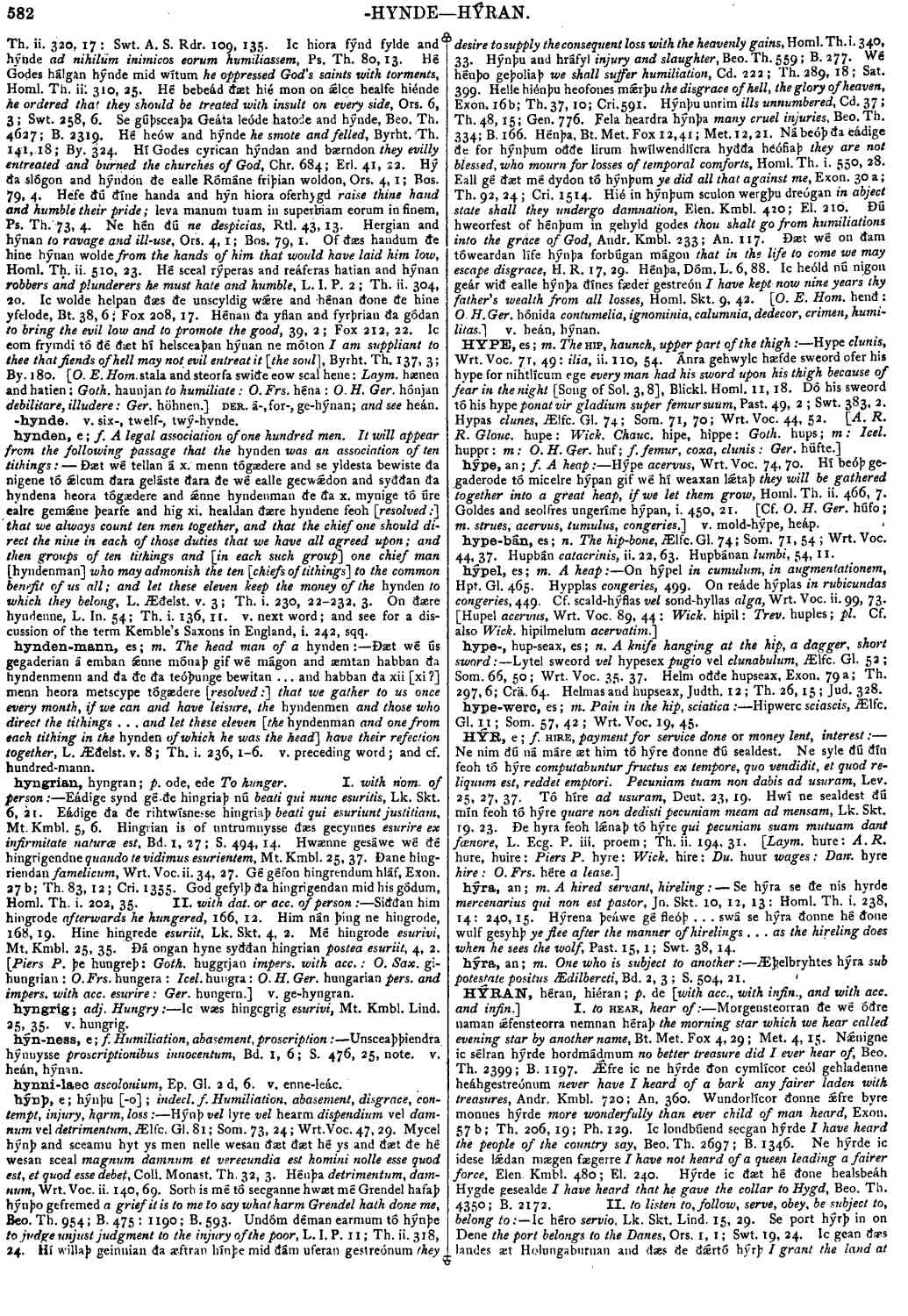hýnþ
- noun [ feminine ]
-
Hýnþ vel lyre vel hearm
dispendium vel damnum vel detrimentum,
- Ælfc. Gl. 81 ;
- Som. 73, 24 ;
- Wrt. Voc. 47, 29.
-
Mycel hýnþ and sceamu hyt ys men nelle wesan ðæt ðæt hé ys and ðæt ðe hé wesan sceal
magnum damnum et verecundia est homini nolle esse quod est, et quod esse debet,
- Coll. Monast. Th. 32, 3.
-
Hénþa
detrimentum, damnum,
- Wrt. Voc. ii. 140, 69.
-
Sorh is mé tó secganne hwæt mé Grendel hafaþ hýnþo gefremed
a grief it is to me to say what harm Grendel hath done me,
- Beo. Th. 954 ;
- B. 475 :
- 1190 ;
- B. 593.
-
Undóm déman earmum tó hýnþe
to judge unjust judgment to the injury of the poor,
- L. I. P. 11 ;
- Th. ii. 318, 24 .
-
Hí willaþ geinnian ða æftran hínþe mid ðám uferan gestreónum
they desire to supply the consequent loss with the heavenly gains,
- Hom. Th. i. 340, 33.
-
Hýnþu and hráfyl
injury and slaughter,
- Beo. Th. 559 ;
- B. 277 .
-
Wé hénþo geþoliaþ
we shall suffer humiliation,
- Cd. 222 ;
- Th. 289, 18 ;
- Sat. 399 .
-
Helle hiénþu heofones mǽrþu
the disgrace of hell, the glory of heaven,
- Exon. 16 b ;
- Th. 37, 10 ;
- Cri. 591 .
-
Hýnþu unrim
ills unnumbered,
- Cd. 37 ;
- Th. 48, 15 ;
- Gen. 776 .
-
Fela heardra hýnþa
many cruel injuries,
- Beo. Th. 334 ;
- B. 166.
-
Hénþa,
- Bt. Met. Fox 12, 41 ;
- Met. 12, 21 .
-
Ná beóþ ða eádige ðe for hýnþum oððe lirum hwílwendlícra hyðða heófiaþ
they are not blessed, who mourn for losses of temporal comforts,
- Homl. Th. i. 550, 28 .
-
Eall gé ðæt mé dydon tó hýnþum
ye did all that against me,
- Exon. 30 a ;
- Th. 92, 24 ;
- Cri. 1514.
-
Hié in hýnþum sculon wergþu dreógan
in abject state shall they undergo damnation,
- Elen. Kmbl. 420 ;
- El. 210 .
-
Ðú hweorfest of hénþum in gehyld godes
thou shall go from humiliations into the grace of God,
- Andr. Kmbl. 233 ;
- An. 117.
-
Ðæt wé on ðam tóweardan lífe hýnþa forbúgan mágon
that in the life to come we may escape disgrace,
- H. R. 17, 29.
-
Hénþa,
- Dóm. L. 6, 88.
-
Ic heóld nú nigon geár wið ealle hýnþa ðínes fæder gestreón
I have kept now nine years thy father's wealth from all losses,
- Homl. Skt. 9, 42.
Bosworth, Joseph. “hýnþ.” In An Anglo-Saxon Dictionary Online, edited by Thomas Northcote Toller, Christ Sean, and Ondřej Tichy. Prague: Faculty of Arts, Charles University, 2014. https://bosworthtoller.com/20328.
Checked: 1